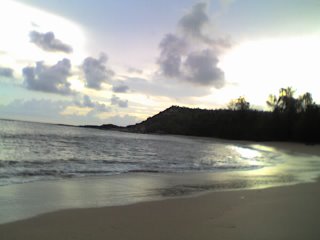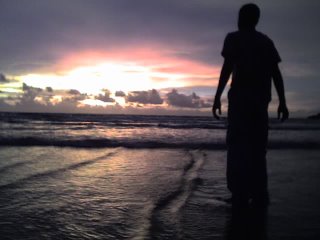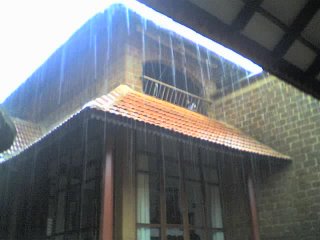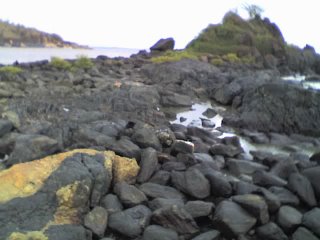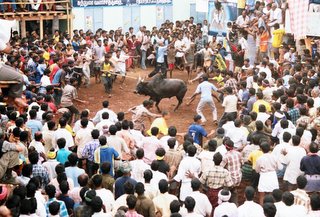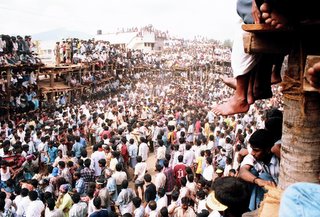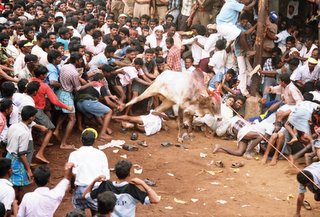When amma and appa planned vacations, it was an annual permission to spend the scrupulously saved salary acorns. The date was first carved in stone, factoring in summer vacations and bank holidays. For months before that set date, everyone in the household was to scan newspapers and previously-ignored free mailers for bargain vacations. In those months, few whims of new shoes and Internet connection were entertained. My dad would raise his hands to mimic a moral balancing scale, “(Right hand) You can ‘surf’ after 3 months … (left hand) or we can go again to Ooty, the Darjeeling of the South.” Polite smiles exchanged, obvious decision choked forth. In their itinerary, there was also always a compulsory temple and relative visit, unfortunately never combined.
Despite all this middle-classness, when we actually went on the holiday, no one was to mention money. I always got the horse ride I wanted, my sister could always eat everything she set eyes on, and after we grew taller than 4.5 ft each, we never had to sleep on extra beds. If my parents pooh-poohed posh-type, spa-type and guided-tour-type packages, it was pure superior judgement. Of course, photographs were taken at every waking hour, with a never-compromised 400 ASA Kodak film (blue tint for beaches, green tint for mountains) and various memorable poses from cousins reflecting the dance-step of the season.
To my mother’s inexpressible shame, my holidays since then have failed her. Holiday decisions taken in the middle of an auto-pilot bike ride home, no meticulous saving, no hotel bookings, hardly ever a travel companion. No prior plan whatsoever. And even if there was one, it had a tendency to stray way off the trajectory. Still, every time I actually set off on a trip, I seem to find exactly the essence of experiences that I would’ve, if in tow with amma and appa. Barring the guilt-salve visit to a revered shrine or relative.
When I rattled off on the phone to her about my recent trip to Srilanka, amma listened, laughed, gasped, and in the end, said, “Aiyo Ro, how did you feel like coming back?”
I don’t think I have, entirely. It is still difficult to let even a day go by without smiling to myself about the Lankan accent I caught, and the train and fish I didn’t. Srilanka was so easy to love. I like to believe it’s because somewhere not very deep inside, I’m an islander. In other words, I have slow reflexes.
But I didn’t get to be a bum in Srilanka this time, given I was there on work and all. TV travelogues, I always thought, would be my dream project. I mean, the combination of a job you love and the thing you love outside the job had to be deadly. So as a shameless student of the Ian Wright and Anthony Bourdain school of fabulous nonsense travel, I packed my bag with ideas and gimmicks that my teachers would be proud of. Until they came undone, one by one.
At the Pinnewala Elephant Orphanage, I decided to ride an autorickshaw (Trishaw). For TV, of course. And all was going well, till the sonorous sound of rickshaw metal slamming into expensive Toyota metal ended the joy ride. Guilt, fear and a large group of trishaw drivers gripped me. They threw sharp Sinhala words my way, and our Tourism Board driver decided to do everything short of singing the Lankan national anthem. He began to demand that I pay up the trishaw’s cost. Yes, the entire trishaw’s cost, because “Srilanka is a poor country”.
It’s stupid, but it was only then that I suddenly realized that I was a foreigner. The brownness and coconutness of everything until then had made me forget. By now, the owner of the dented car had arrived—a sweet looking uncle I immediately warmed to and asked in English what I should pay for damages. But the sweet uncle said “I’m calling the police.” Utterly unnecessary, I explained, but his ears were red and receiving only panic signals from the meddling mob. Through a mind clouded with images of my last rites in Colombo, I hazily realized that when a mob gets unruly by the minute, and the word passport is screamed a lot, it’s time to discuss dollar exchange rate. An hour and many wasted calls to the Tourism Board later, I paid up what a friend later told me was a reasonable amount. Later the same evening, in a Buddhist cave, our camera was confiscated by a monk for being a video camera. I’m surprised I still woke up happy the next morning.
I’m glad I did too, because that country is beautiful, dammit. And the previous day, I may have just walked into a meeting of ‘The Community of Only Horribles in Srilanka’, because I didn’t meet a single mean or unhelpful person after that. They readily invited me to private parties, they showed me into their homes for a change of wet clothes, they fed me till I was ready to be their slave.
I travelled through West and South Lanka, the East and North being cut off for tourists now because of LTTE activity. Even in just those two directions, there was so much to do, and so much to film. And it didn’t help that almost everything I wanted to see was plopped dauntingly on a hill or some natural elevation meant to deter the weak spirited. Sigiriya, Dambulla, and Kandalama. All scaled twice over thanks to retakes. The incredible view shut up any whining I was trying to squeeze through the tired wheezing. So quiet, so plundered, and yet giving the impression of being so untouched.
The South Coast was an endless stretch of aquamarine that I have only managed to see in an art class palette. I was to stop at Koggala beach, where I was told fishermen use a method not seen in any other part of the world—they get on stilts poked in the middle of crashing waves. And just sit there, waiting for the fish to bite. As we neared the shore, 5 men came towards me, looked at the camera, cheered up and took our patriotic driver aside (he had by then, started to like us, and given up on the tourist milking). The unprofitable stilt fishing, I understood, worked a lot better as bait. To net the awed tourist looking for a perfect sunset shot. The terms were discussed, but they hadn’t accounted for me insisting on getting on one of the stilts. The waves threw me off a few times, and I landed with my head on the rocks, but later, one of the fishermen told me in perfect flirtatious English that I could be his fisherwoman any time I wanted.
Travelogues always end with last lines that read as if the author has a faraway look, a lazy smile, and a nostalgic sigh as the best moments of his before his eyes in slow motion. Mine though, I see in fast mode, because so many people happened-- a schoolgirl I took around on a cycle as she taught me Sinhala, a crackly-skinned old woman who was shocked I spoke Tamil, a boy who took me around in a moped and then carried the heavy equipment, a frenchbearded fellow who noticed my dorky shoes, a curly haired girl who lined up her family and friends and sent them marching to help me.
Actually, right now, I don’t mentally picture the sights I saw there. I still get the schoolgirl’s smses, and the curly haired girl’s online hugs. The Srilanka experience continues... Now more than vacation leftovers, perhaps even entwined with my daily life, its routines and variety. I’m also joyous in the knowledge that my restless feet will shuffle their way to all these people once again. And believe me, this is not the arrack talking.
